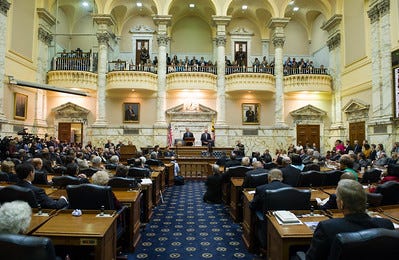#23: CIVICS 101: The Legislative Branch
Q&A #23: In the event of the death, resignation, or declination (refusal to serve) of a Member of Congress, how is the vacancy filled?
Our American Government
Our American Government is a small book published by the House of Representatives for citizens and those who seek a greater understanding of the American interpretation of democracy. It follows a question-and-answer format and covers a broad range of topics dealing with the three branches of our Government, the electoral process, and the role of political parties.
The Savvy Citizen is reproducing the 169 questions-and-answers through a series of posts called Civics 101. Each post will contain the Q&A as well as some additional commentary to add historical context, fun facts, or anything we believe will add to our collective understanding of these topics.
Think of it as your adult Civics class, but without the test!
Let’s keep at it.
SECTION: The Legislative Branch: The Congress
Members, Offices, and Staff
Q&A #23: In the event of the death, resignation, or declination (refusal to serve) of a Member of Congress, how is the vacancy filled?
The Constitution (Article II, Section 2, Clause 4) requires that all vacancies in the House of Representatives be filled by election. All States require special elections to fill any House seat that becomes vacant during the First Session of a Congress. Procedures governing vacancies occurring during the Second Session of a Congress differ from State to State, and are largely dependent on the amount of time intervening between the vacancy and the next general election.
In the Senate, when a vacancy occurs for any reason, the 17th Amendment directs the Governor of the State to call an election to fill such vacancy, and authorizes the legislature to make provision for an immediate appointment pending such election. Among the States, only Arizona and Wisconsin do not allow the Governor to make interim appointment, requiring, instead, a special election to fill any Senate vacancy. Prevailing practice in the States is that a special election to fill the vacancy is scheduled to be held at the time of the next statewide general election.
My Thoughts
A Congress lasts for four years, but is divided into two unique two-year sessions. A new Congress begins with the beginning of each Presidential term. We are currently in 118th Congress, Second Session. When the new Congress is sworn in on January 3, 2025, it will begin the 119th Congress in the United States (going back to the founding).
Given that two Congressman (Waltz and Gaetz) from Florida have been tapped to serve in President Trump’s cabinet, special primary and general elections will be called at the earliest date possible to fill the House seats.
As for Florida’s Senator Rubio, who has been nominated to serve as Secretary of State, Florida Governor DeSantis will appoint an interim replacement to serve until a special election is held during the 2026 election cycle.
—
Back next time with Q&A #24: How can Members of Congress be removed from office or punished for misconduct?
Meanwhile, don’t forget that we’re organizing the post links on a single page available here.
xo,
Kelley for the Savvy Citizen Team
November 22, 2024





